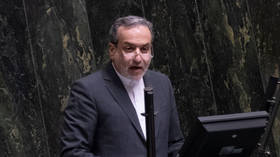The more sanctions Washington imposes against Tehran, the more resistance it will face, Foreign Minister Abbas Araghchi has said
Iran is not opposed to new negotiations about its nuclear program but does not want them to be an exercise in futility, Foreign Minister Abbas Araghchi told the Tasnim news agency in an interview published on Thursday. The outcome of any talks would ultimately depend on the willingness of the US and its allies to treat the Islamic Republic with respect, he added.
The minister said that his nation’s nuclear program is entirely peaceful and that Tehran is ready to address any concerns other nations have while not placing limitations upon itself as long as its actions stay within the framework of peaceful development.
“We operate within that scope. Those who have concerns are welcome to come forward so we can discuss and negotiate to address their worries,” he said.
Iran’s top diplomat also warned that the tactics of sanctions would not work with the Islamic Republic, particularly referring to the “maximum pressure” policy employed by the US during the first term of incoming President Donald Trump.
“The more they impose sanctions and pressure on Iran, the more Iran will show resistance,” Araghchi said. He called on the Western nations to treat his country with dignity instead. “If they opt for the course of fair, just and dignified negotiations and speak with the language of respect, we will speak that language as well.”
According to the minister, the US and its allies only understand the language of strength. The Islamic Republic’s missile capabilities are what make the West want to talk instead of using force, he believes.
“I have said many times and firmly believe that if it weren’t for our missile capabilities, no one would be negotiating with us,” Araghchi told Tasnim. “If they could destroy our nuclear facilities with a military strike, why would they bother sitting down with us for over two years to negotiate? … The reason is that they did not have the capability to militarily eliminate our facilities.”
Iran’s uranium enrichment activities have long been perceived by the West as a clandestine attempt to develop atomic weapons – something that Tehran has repeatedly denied. In 2015, the Islamic Republic reached a nuclear deal with world powers, known as the Joint Comprehensive Plan of Action, that limited Iran’s nuclear program in exchange for partial sanctions relief.
However, in 2018 the US unilaterally withdrew from it under Trump. Iran has since stepped up its enrichment capabilities while efforts to revive the deal have thus far failed. Last month, the head of the International Atomic Energy Agency, Rafael Grossi, said that Iran was “dramatically” accelerating its uranium enrichment to up to 60% purity, calling this development “very concerning.”

 By Russia Today | Created at 2025-01-02 21:15:17 | Updated at 2025-01-05 03:46:53
2 days ago
By Russia Today | Created at 2025-01-02 21:15:17 | Updated at 2025-01-05 03:46:53
2 days ago









